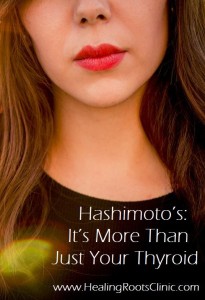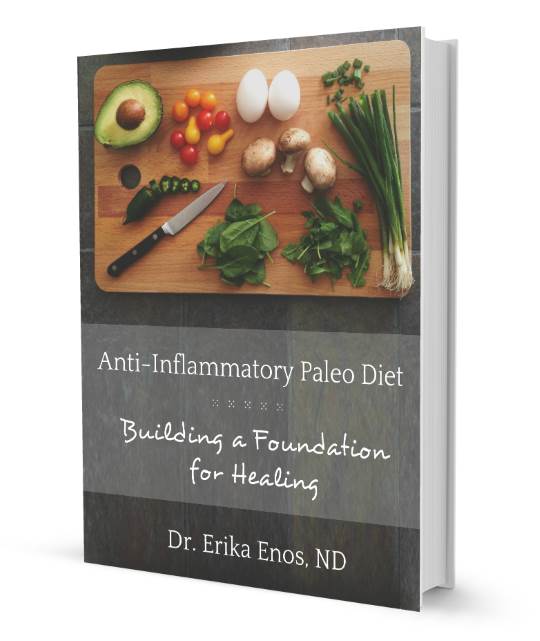Hashimoto’s is the most common autoimmune disease around. It is so common that it’s probably more often though of first as a thyroid condition and secondarily as an autoimmune issue. If you’ve been diagnosed with Hashimoto’s, you’ll have much greater success in reversing the disease process and feeling awesome if you think of it first as an issue of autoimmunity. An autoimmune disease is when the immune system erroneously attacks healthy cells whether it’s the skin (such as Vitiligo), nerves (like in Multiple Sclerosis), lining of the small intestines (such as Celiac Disease), or joints (as is the case with Rheumatoid Arthritis).
 Hashi’s is an autoimmune hypothyroid condition where the immune system is mistaking thyroid tissue for a foreign invader and attacking it. Symptoms of Hashimoto’s can look just like hypothyroid symptoms from other causes. Or, and this is where it can get really confusing, it can sometimes look and feel like yo-yo-ing back and forth between hypo- and hyper-thyroid symptoms. The hyperthyroid symptoms are a result of the thyroid releasing excess thyroid hormone as thyroid tissue is destroyed by the confused immune system.
Hashi’s is an autoimmune hypothyroid condition where the immune system is mistaking thyroid tissue for a foreign invader and attacking it. Symptoms of Hashimoto’s can look just like hypothyroid symptoms from other causes. Or, and this is where it can get really confusing, it can sometimes look and feel like yo-yo-ing back and forth between hypo- and hyper-thyroid symptoms. The hyperthyroid symptoms are a result of the thyroid releasing excess thyroid hormone as thyroid tissue is destroyed by the confused immune system.
For a list of these symptoms, scroll to the end of the first blog in this series: The Basics. And in case you missed the rest of the series thus far, check out Why Only Testing TSH Isn’t Enough, How Thyroid Disease is Over-Medicated, and Non-autoimmune Hypothyroidism. Now we’ll be looking at autoimmune hypothyroidism which is referred to as Hashimoto’s.
Many people don’t realize that Hashimoto’s is the most common form of hypothyroidism; most people who have been diagnosed with hypothyroidism have Hashimoto’s and they usually don’t even know it! Why is this? For many medical doctors, their toolkit for addressing hypothyroid disorders is incredibly small; it’s basically to prescribe a pill that will be taken everyday as a thyroid hormone replacement. Since there is only one answer for both autoimmune and non-autoimmune hypothyroidism and we know that Hashimoto’s is by far the most common cause of hypothyroidism, most MDs don’t bother to even test for Hashimoto’s. From my perspective, confirming an autoimmune reaction is hugely important because it will greatly change the approach I take to help a patient heal. You’re probably anxious to know what that approach is and what you can do, but first, let’s briefly talk about underlying causes of Hashimoto’s.
Causes of Hashimoto’s
The cause of any autoimmune disease has been a big question mark for many decades. We now have a much better understanding of the probable cause(s). Three factors are thought to contribute: 1) a genetic predisposition, 2) a leaky gut, and 3) a trigger (which can be a big grab bag! I’ll go into more detail in just a minute). These three things are thought to the triad behind all autoimmune diseases.
#1 – A Genetic Predisposition
First, let’s address the idea of a genetic predisposition since genetic testing is such a hot topic right now. A genetic predisposition is by no means a life sentence that you will develop a particular condition. Every single one of us has a genetic predisposition for something, whether it’s thyroid issues, autoimmune diseases, diabetes, dementia, cancer, etc. Genetic predispositions tell us how a disease is likely to show up if we get too far out-of-balance and/or meet with too many obstacles to good health. There are times that genetic testing can be useful and relevant but probably not for Hashimoto’s and many other conditions.
The best way to handle genes it to work with the factors you have control over, like the health of your gut and the environment surrounding your genes.
#2 – Leaky Gut
Until recently, leaky gut was considered a made-up theory by those crazy naturopathic doctors and fringe health practitioners who thought good health depended on a healthy liver and gut (which is short for the digestive tract which goes from the mouth to the anus, including the small and large intestines). Well, guess what? Leaky gut has been proven to really exist (1, 2, 3) and have a huge impact on health. For right now I am going to keep my explanation of leaky gut brief.
The cells lining your digestive tract form a thin lining (the thickness depends on what part of the digestive tract we are talking about) that separates the content of your gut from the rest of your body. These cells, called enterocytes, have tight junctions between them. The name “tight junction” is very descriptive because it illustrates that the gut is trying to make a discriminating barrier and choose what gets absorbed into the body and what gets eliminated. The discrimination process is very important. We don’t want to absorb undigested food particles or let the tissue below the thin gut lining be exposed to bacteria, viruses, parasites, undigested food, toxins, etc. That tissue below the lining is home to 70-80% of your body’s immune system. When the gut barrier gets disrupted and becomes leaky, your immune system is very likely to react to these foreign particles. This creates immune dysregulation. And if you are really curious to know what causes leaky gut, this will be covered in a future blog post coming very soon… I promise!
#3: Triggers
Triggers is a broad category and many of them can also contribute to the development of leaky gut. Here are some of the triggers associated with the development of Hashimoto’s:
- Stress
- Chemical toxins
- Heavy metals
- Infections, including:
- Mycoplasma
- Candida (Yeast)
- Epstein Barr (Mononucleosis)
- H. pylori
- Borrelia burgdorferi (Lyme Disease)
- Yersinia
- Nutrient depletions, particularly selenium, due to:
- Diets high in processed foods
- Choosing non-organic foods that are grown in nutrient-depleted soils
- Low stomach acid and pancreatic enzymes (often due to how we eat… check out How Do You Eat? and 6 Habits for Good Food Hygiene)
- Impaired absorption due to leaky gut
- Iodine excess (especially in the absence of adequate selenium). It is wise to only supplement iodine under medical supervision.
- Inflammation due to:
- Injury
- Toxins
- Low Omega 3s in diet
- Rancid oils in diet (examples include vegetable, canola, soybean, cottonseed, and safflower oils)
- Food sensitivities
- Imbalanced intestinal flora
- Infections (like those mentioned above)
With all of these possibilities, it might seem overwhelming to know where to start or how to know what is really going on. I’m here to help! And I strongly suggest starting with the gut.
For some practitioners this means starting with expensive tests like stool testing to look for gut infections, gut inflammation and how well food is being broken down, food sensitivity testing, confirming leaky gut, and/or organic acid testing. Trust me, we can assume many of the results from this sort of testing if you have Hashimoto’s or any other autoimmune disease. In most cases, I advocate starting with treatment including an anti-inflammatory autoimmune Paleo diet*** to remove the most common food sensitivities and all processed foods that might be triggering leaky gut. I also send new patients home with a list of Foundational Habits that will help them to detoxify a little bit everyday and manage stress. When people return 2 -3 weeks later, most already see massive improvement and this helps clear up the picture so I know where to focus next and how best to invest their money and time in testing and treatment.

What are some of the Foundational Habits I recommend for Hashimoto’s and other autoimmune conditions?
- Pay attention to how you eat, not just what you eat. This in and of itself helps to repair the gut. (Be to read How Do You Eat? and 6 Habits for Good Food Hygiene.)
- Get moderate exercise daily and work up a sweat a few times a week. If you are extremely fatigued and have adrenal issues, this recommendation would get modified. The movement of lymph and sweating help to detox the body among other benefits.
- Brush yourself with a dry skin brush. This also helps move lymph fluid to detoxify. Lymph movement also helps fat soluble vitamins and hormones get delivered to tissues. (Wellness Mama has a good explanation about dry skin brushing here and Ashley’s Green Life has a short video here.)
- Filter your drinking, shower, and bathing water and drink half of your body weight in ounces of water everyday (a 150-pound person would try to drink about 75 ounces or 9 cups of filtered or spring water every day). Typical drinking water contains things like fluoride and chlorine which can be challenging for your body, and especially includes your thyroid as I discussed in the Non-autoimmune Hypothyroidism blog. Drinking water can also contain arsenic and many other toxins. The Environmental Working Group can help you choose a filter for your house. An inexpensive alternative for drinking water is the BPA-free ZeroWater & Filtration System (and replacement filters). Berkey has a good filter for your shower head too.
- Deep belly breathing daily. Depending on the patient, I’ll ask them to set a goal between 10 and 100 breaths every day. Your breath should cause your belly to expand but your shoulders should move very little. When we breathe high in our chests and our shoulders move up, this activates our sympathetic nervous system and it creates a stressful state within us. When we breathe into our bellies, we activate our parasympathetic nervous system and this state allows our body to repair. Another breathing trick for shifting from a sympathetic to a parasympathetic state is to make your out-breath longer than your in-breath. For example, breath in for a count of 4, pause, breathe out for a count of 6.
 These are just some brief examples of Foundational Habits I suggest to patients. When a patient with Hashimoto’s comes in and is already onboard with an appropriate diet and is familiar with some of these habits, then we can delve into the next steps of treatment more quickly. Next steps can include supplements that help balance the immune system, most notably vitamin D, cod liver oil, and a high-quality probiotic. (All of these are very safe for most people but you should always check with your provider before starting a new supplement.) During an appointment, we might also look into supplements that heal the lining of the digestive tract and repair leaky gut.
These are just some brief examples of Foundational Habits I suggest to patients. When a patient with Hashimoto’s comes in and is already onboard with an appropriate diet and is familiar with some of these habits, then we can delve into the next steps of treatment more quickly. Next steps can include supplements that help balance the immune system, most notably vitamin D, cod liver oil, and a high-quality probiotic. (All of these are very safe for most people but you should always check with your provider before starting a new supplement.) During an appointment, we might also look into supplements that heal the lining of the digestive tract and repair leaky gut.
Once these things are done, you can then move on to talking about possible triggers. As a naturopathic doctor, I take very thorough histories and can often figure out which triggers are most likely a contributing factor for you; other times, a series of tests is most helpful. To address the triggers, I commonly use a combination of homeopathic therapies, herbs, and nutrients. I also find it is important to continue to ask the question of why a person was susceptible to a particular trigger. It takes digging to get at the underlying causes!
Through this holistic process, I am honored to watch patients undergo pretty amazing changes. While the original complaints about thyroid and autoimmune-related symptoms improve, we also get to see many “side-benefits.” These could be things like radiant skin, stronger nails and hair, more energy than they can imagine, and a greater sense of connection. This is because people become more healthy overall and more in-tune with the wants of their body, mind, and spirit. Simply popping a thyroid replacement pill everyday probably won’t bring about these kind of changes!
Now… I would love to hear from you! Please share your stories about dealing with Hashimoto’s in the comments below. What has worked and what hasn’t? What other information would you find helpful?
***A quick note on diets like the anti-inflammatory autoimmune Paleo diet—this recommendation can sound daunting and like a deal-breaker to many people. Who wants to be on a strict diet for life? No one. It is my opinion and experience that after leaky gut and triggers have been addressed, you shouldn’t have to stick 100% to such a diet to maintain good health. You should be able to have flexibility and enjoy a wider variety of food. One step in treatment is figuring out what the wider variety, based on a whole foods and nutrient dense diet, is for each individual. The diet is just a tool, not a sentence 🙂

i am wondering if you can treat a vegan?
Do you also treat theses conditions with medication? Or do you see improvements in labs without medication? Also if this genetically runs in someone’s family, do lifestyle changes make a difference? Lastly, if a patient has had labwork showing she doesn’t have an inflammatory response to dairy or gluten and all her inflammation markers are at normal levels, do lifestyle changes help? I’m asking this as an otherwise healthy and active adult female in my 30’s who weights 110lbs – I have had hashimoto’s hypothyroidism for 3 years and have not been able to find a medicine combination that seems to alleviate my symptoms.
Hi Monica,
Whether or not I recommend medication as a tool depends entirely on the individual case. Some of the factors I consider are lab findings (TSH, antibody levels, other inflammation and AI markers, adrenal health, etc.), patient’s symptoms, patient’s motivation, and the patient’s preference. NDs aren’t can’t prescribed thyroid hormone in Colorado, so I refer patients to an endocrinologist, PCP or gynecologist for medication if it is needed. You can see improvements in labs without medication. Medication often improves only TSH (which can be a helpful things to do while working on the root cause) and often doesn’t change the antibody level much. If a patient is already on thyroid hormones or if they are not medicated, I track antibody levels.
Thyroid issues are not genetically determined. There are actually very few diseases that are spelled out by our genes (and the severity of many of these can be modulated through diet, lifestyle, etc!). We often think something is genetic because it runs in our family, but it is probably more helpful to think of it as a susceptibility that we have in common with our family members. Things like diet, lifestyle and environment will absolutely help determine whether that susceptible area becomes an issue or not.
The gold standard for food sensitivity testing is an elimination diet. I will sometimes use lab testing but with thyroid issues, it is most often a good idea to eliminate gluten and dairy regardless of what the labs say- that is the quick answer for that issue! To answer your specific question, gluten and dairy are just two aspects of diet and lifestyle changes. There are many others that can and often need to be made to heal the thyroid. Sometimes you have to address multiple issues before you can accurately determine whether or not dairy is an issue. Refer to the “Trigger” list.
OMGSH! I just found this webpage today and think it has the BEST description of Hashimoto’s that I have ever seen and I’ve read A LOT about it! I am sure I had it back in 1999 because that is when I went to the doctor asking for my thyroid to be checked and my TSH was normal. This occurred for years, fast forward to 2013 and I was finally diagnosed after my sister was diagnosed (no one would run the antibodies before then because my TSH was always normal). It has been an up and down process, however I was very thankful to finally have a diagnosis for my “mental issues and laziness” as one physician told me – needless to say I didn’t stick with him. 3 weeks ago I started feeling like my heart was skipping a beat. I went in and was tachycardic, so my dose got lowered of my Armour thyroid. I began taking it and the tachy came back so stopped my meds Sat/Sun & started again Monday it has now been almost 2 weeks and my heart is now having a sinus pause. I am currently on Selenium, a probiotic, and Iodine – prescribed by my current physician. I just this week began a Paleo diet, so it is too early to tell how it will change the way I feel. I am VERY exhausted, achy and having this heart issue. I go back to my physician in 2 weeks and hope that he will have some answers for me. I was also diagnosed with Rheumatoid Arthritis in October, so reading about paleo diet and it’s reduction of inflammation is what caused me to give it a try. I very much have enjoyed reading all of this. I will continue to follow!!
I also forgot to mention that my 13 year old daughter was just diagnosed with Hashi’s as well. She is on Selenium, Iodine and Probiotic only half the time, I take mine daily she only takes hers every other day. I just want to feel well, I don’t feel like I have felt well in too many years to count. At my last visit my antibodies were 1, so that sounds good; then why do I feel so awful? I’m discouraged to say the least.
Hi Jill, Thanks for commenting and sharing your journey. Your’s is a familiar story. Here are some ideas and things to remember:1) you may want to follow a full AIP diet for 1 or more months while your body is healing (you can download my guide to AIP at the bottom of my blogs). 2) Iodine and selenium can be a mixed bag of results of Hashi’s! Sometimes they are great and other times they can worsen the situation, so remember to communicate your experience to your physician so he or she can determine it they supplements are helping or hurting 3)Hashi’s can involve more than one type of antibody- both should be checked, you might find that one is low or non-existent while the other is sky high 4) Since you have multiple AI issues (you stated RA), you’ll definitely want to broaden your treatment to involve more systemic issues and immune balancing in addition to therapies targeted primarily at the thyroid (like selenium, armour and iodine). Ask your physician what their long term plan is- they might already have this all in mind! Remember that the healing process takes time and hand in there.
My husband has hashimotos. He is on Naturethroid and seems to work better than anything. However, I feel that something he has an intolerance too or allergic too interacts with his body and makes him swing. How do we find these triggers? Or is it something interacting with his meds? Food, chemicals, etc. He eats clean, exercises, does not have consistent sleep due to his job. We hare having hard time finding a dose that works for him and mainstream docs don’t help. How do we find these triggers? What do we test for? Feeling out of answers.
Hi Carrie,
You might consider starting with an elimination diet. An AIP diet is my go-to for this and you can get a free copy of the guide I use with my patients by signing up for my newsletter. In most cases, this is more accurate the food sensitivity testing and certainly more cost effective. It is important to note that the elimination diet is a fantastic starting place but most people with thyroid issues also benefit form a comprehensive stool analysis to look at the health of the gut. I would suggest that you work with a qualified practitioner (an ND or a functional medicine doctor) to guide you in test choices and how to address the results. This is the best way to avoid ordering tests that are not needed or are not thorough enough. There could also be environmental triggers as well- consider removing chemically based cleaners from your home and personal care products. Best of luck! There are answers out there.
Hi Dr. Erika,
I have been diagnosed with Hashimotos and in April 2018 started experience brain fog. I was diagnosed twelve years ago with hypothyroidism and hadn’t taken the meds for 11 years until the onset of the brain fog in April. Other than brain fog, my facial skin has been a mess with something that looks rash/pimples and so I’m really ready to get my health back. I’m on Levothyroxin .5mcg and test show thyroid is normal but my body isn’t.
Erika!
This blog post is extremely informative and got me thinking about what I do to treat my Hashimotos beyond “the little white pill”. I’ve eliminated Gluten and Dairy from my diet for 3 years now and have felt a world of difference and lower impact workouts have definitely kept my adrenals in check. I also just read your blog on grounding and the effects of being in nature daily- so informative. I find your information super easy to follow and understand- so glad my sister forwarded me your blog 🙂 Looking forward to learning more! Hugs from Tokyo! xoxo Kate
Hi Kate!!! What a sweet surprise to find a comment from you! So glad you found my blog via your sister. I love to hear that you are finding them informative and easy to follow- that’s my goal! I also love that you’re inspired to dig a little deeper into Hashi’s. I promise it will pay off in the long run. Hugs from Denver.